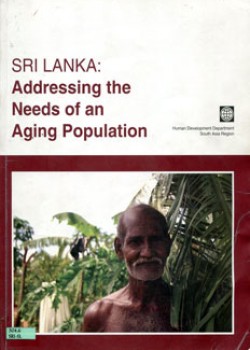
Sri Lanka. Addressing the Needs of an Aging Population
Publisher: The World Bank (WB)
Place of Publish: USA, Washington D.C.
Year: 2008
Page Numbers: 123
Acc. No: 3199
Class No: 304.6 SRI-SL
Category: Books & Reports
Subjects: Population
Type of Resource: Monograph
ISBN: 978-955-8908-31-0
The current rate of growth of Sri Lanka’s ageing population is exceedingly high in comparison to its level of income. Traditional intergenerational systems in place currently lack the time it would require to adapt as the speed of the ageing process would be unparalleled in the industrial world. If unprepared for this change in demographic Sri Lanka is likely to face substantial social challenges at the level of income and pension system coverage.
This study identifies key issues that need to be addressed in order to avert serious issues, or even crisis, as the inevitable shifts in population take place in Sri Lanka. The four main chapters of this report focus on these four critical areas in turn. This research examines living arrangements, intergenerational transfers as well as the respect and authority old people enjoy.
With lack of independent financial sources being one of the biggest problems faced by the elderly this research also provides an analysis of formal income support programs including pensions and relevant safety net programs whilst also evaluating the health status of old people and how well placed the healthcare system is to cope with an aging population. The study provides important policy recommendations and analysis through which it becomes apparent that there will be very real problems ahead for Sri Lanka in light of its changing population trend for which inaction would not be a viable solution.



